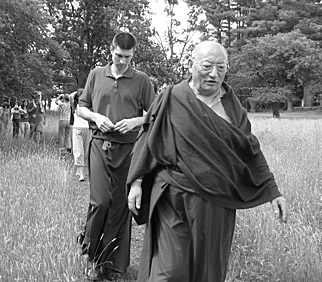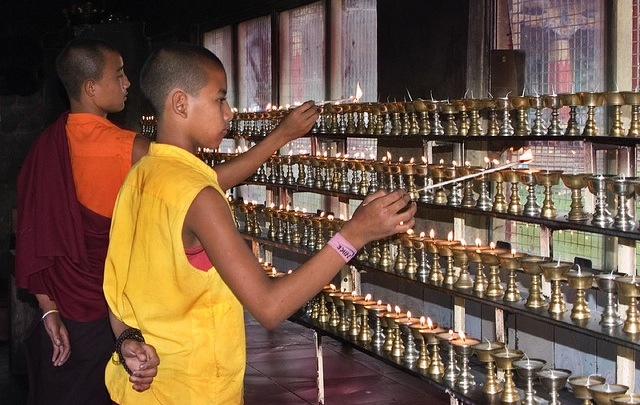Lately I’ve been asked many questions about my past as a Buddhist monk, I’ll take John’s comment as an example [excerpt] – “I am most interested in Tibetan Buddhism and would like to know how to go about selecting a monastery and starting the path of a monk.”
A John kindly suggests, I’ll try to cover more elements on Buddhism in my next posts.
Let’s start with actionable items, I’ll share 4 habits common to most Buddhist monks.
They’re not rituals or exotic dances, yet they are:
– Deep: their benefits convinced me to adopt them in the long run.
– Innovative: they go against what the marketing industry wants you to believe.
– Actionable: you don’t even have to be a monk to adopt these habits, all it takes is a will to change :)
Habit 1- Outer decluttering
The Buddha was born a Prince, he could have spent his life in a palace enjoying the best lifestyle his status had to offer.
But he didn’t.
When he realized the frustrating nature of materialism, he abandoned everything to focus on spiritual attainment.
2300 years later, Buddhist monks still adopt this conduct by keeping material possessions to the bare minimum.
Many of them only have:
- a bowl
- three robes
- a bathing cloth
- an umbrella tent
- a mosquito net
- a kettle of water
- a water filter
- razor
- sandals
- some small candles
- a candle lantern
That’s all, it fits just right in a small backpack.
Needless to say that owing nothing is a time-saver, you don’t have to worry about cleaning your swimming pool or fixing the garage door, it’s a hell of a relief.
Since you’re reading this article, chances are you’re interested in decluttering your life out of unnecessary items, Leo Babauta describes the decluttering process in detail here.
Habit 2- Inner decluttering: taking care of others
In many Buddhist traditions, monks learn to do things not only for themselves, but for the whole world:
– They meditate for the sake of everyone
– They study to be able to support others more efficiently
– They try to attain enlightenment to reach their full potential and help those in need
When you develop a selfless attitude, your mind stops running in circles around personal problems, it opens up and gets less emotional. That’s how some monks develop a stable and efficient attitude.
Sounds too simple to be true?
Yet, your personal experience might confirm that rule: don’t you feel strangely quiet and relieved when you reach out to a friend to offer your help?
Isn’t it more difficult to find excuses not to?
That’s called inner decluttering: making room for others and dumping selfish habits.
Habit 3- Meditating A LOT
Buddhist monks meditate.
That’s supposed to be why they become a monk in the first place: having more time to practice.
They wake up very early (4 to 5 am) and start their day with a good 1 to 3 hours of meditation straight. It’s pretty much the same schedule at night.
This kind of intense practice doesn’t merely reduce stress, it changes the way your brain functions and perceive things. For those already meditating daily, you know the benefits.
The good news is: you can be a hardcore meditator without living the monastic life, all you need to do is cut down on reality TV and online shopping.
Why not start slowly with 30 mn of meditation each morning? If you do it with persistence, your mind will naturally ask for more time to meditate, effort won’t be needed anymore.
Habit 4- Following the wise

Khenchen Rinpoche, daily walk
No old people in ads or on magazines’ front pages.
Communication agencies turned their backs on the 70+ long ago.
Our lifestyle, our media, everything in our society exudes the fear and loathe of old age.
Because they belong to more traditional civilisations, Buddhist monks have a healthier connexion with seniors. They generally follow an old spiritual guide to whom they can talk and get advice from.
If their guide is a genuine one, they can even watch every of his moves to get inspired everyday.
When I look around, I always find insightful people from whom I can learn, it’s particularly true with the elderly. They’re not necessarily wiser, but more experienced for sure.
I chanced to meet a genuine old Tibetan master to emulate (couldn’t match his qualities, unfortunately), and although that kind of guide is hard to come by, it’s always possible to tap into older people’s knowledge around us, probably the smartest way to gain wisdom and avoid humanity’s ever-repeated mistakes…
I’ll post some more about smart Buddhist habits, feel free to subscribe to gr0wing.com:

